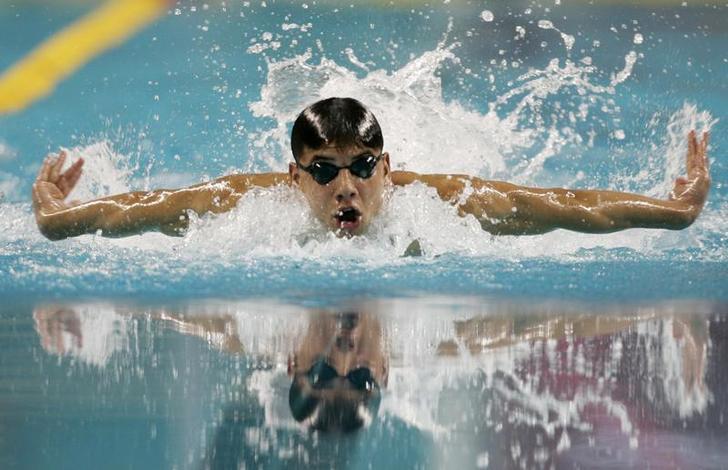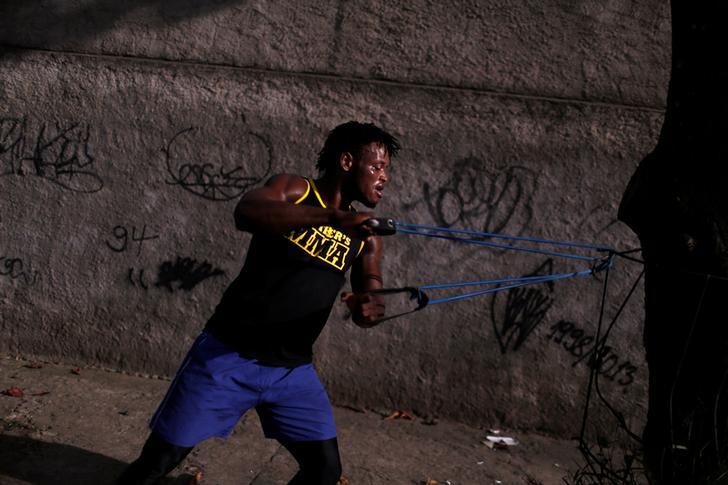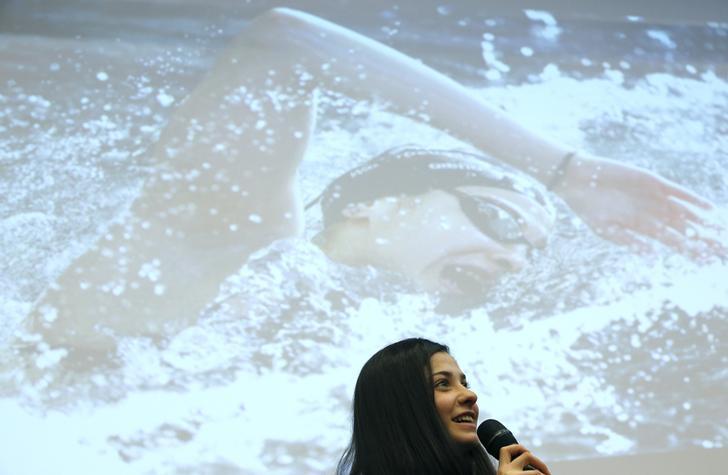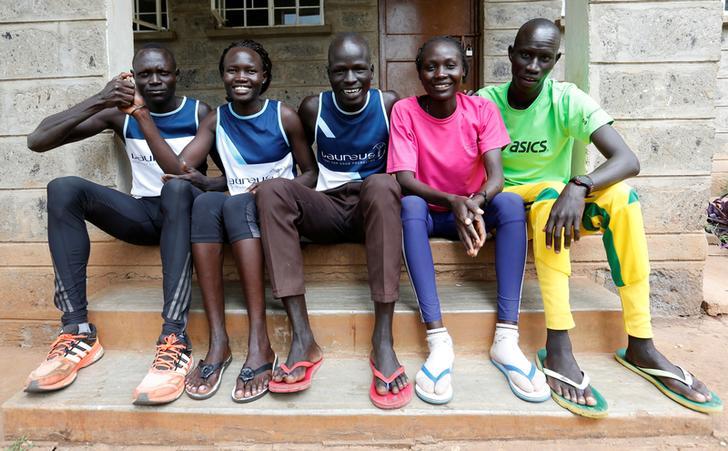Meet some of the athletes who will compete in this summer’s Olympics as a team of refugees
Five runners from South Sudan pose for a photo after a training session at their camp in Ngong township near Kenya's capital Nairobi on June 9, 2016. This summer they will compete in Rio with the first team of refugees in Olympic history.
In August of 2015, Yusra Mardini and her sister, Sarah, fled Syria after their home was destroyed in the country’s civil war.
They traveled by land through Lebanon and Turkey, eventually boarding a boat with 18 other refugees. When that boat’s motor failed in the Aegean Sea, Mardini, her sister, and another woman jumped out. Together, they pushed the boat for three hours to the island of Lesbos.
Mardini would later tell a press conference in Berlin that “it would be a real shame if I drowned in the sea.” Many refugees do drown attempting to reach safety in Europe — 2,500 this year alone — but that is not what Mardini meant.
Mardini is a competitive swimmer. She is also one of 10 athletes selected to compete on a team of refugees at the 2016 Rio Olympics. For a group of people stripped of their homes and citizenship, participation in the games is part of an effort to restore an element of their humanity: sports.
Before this year, Mardini and her fellow teammates would have been ineligible to participate on any Olympic team. That’s a violation of the Olympic Charter, which considers playing sports a human right. “Every individual,” the Charter reads, “must have the possibility of practicing sport, without discrimination of any kind.”
This noble value raises a fundamental problem. The Olympics hold national competitions. While everyone may have a right to practice sport, not every athlete has a nation to call home.
The International Olympic Committee hopes to rectify that dilemma by creating Team Refugee Olympic Athletes (ROA).

Also: No one embodies 'Olympic spirit' like the athletes on this summer's refugee team
The refugee team was created by the International Olympic Committee in response to the global refugee crisis. The United Nations estimates there are nearly 20 million refugees and 60 million displaced peoples around the globe.
“This will be a symbol of hope for all the refugees in our world, and will make the world better aware of the magnitude of this crisis,” said IOC President Thomas Bach, when he announced the final team selection. “It is also a signal to the international community that refugees are our fellow human beings and are an enrichment to society.” The refugee team is funded by the Olympic Solidarity Programme, created to assist national Olympic committees in need of organizational resources and training support. The solidarity program already supports more than 1,700 athletes from developing countries, in addition to the refugee team.
When the refugee team makes its entrance at the Opening Ceremony, it will be the first team in Olympic history to do so without representing a nation. They will march to the Olympic Anthem. They will carry the Olympic flag.

Allowing 10 refugees to compete does not mean every human population will now have access to the games. There are still groups, like Tibetans, who remain in political situations that exclude them from bringing a team to the Olympics. Tibetan athletes must compete under the Chinese flag, if at all. Nevertheless, the creation of a refugee team makes it possible to imagine a more inclusive future. Tenzing Sherap, Program Manager at the Tibetan American Foundation of Minnesota, praised the IOC for creating a space for refugees, and for recognizing that “these things are not about sports only but about longing for freedom.”
More: Olympian Yolande Bukasa Mabika says her story shows that not every refugee tale ends in misery
Most refugee stories in the media focus on hardship and tragedy: dangerous mass movements, dilapidated tent cities and refugee camps. “These are important pictures but they depersonalize the refugee story,” said Bill Canny, executive director of migration and refugee services for the United States Conference of Catholic Bishops. “The more that [the] Olympics can personalize, tell a personal story about a refugee and his or her family, I think it makes it more real for us to see how in fact these people differ very little from us if at all."

This is important at a time when global public perceptions of refugees are low. Pew Research reports that refugees have been met with disdainful public opinion in the United States. Given the Olympic-sized audiences Rio will bring, the stories of refugee athletes will provide a powerful opportunity for skeptics to reconsider their feelings about refugees. The London Summer Olympics in 2012 was the most watched TV program in US history. Second on that list is the Beijing Summer Olympics in 2008. Worldwide, the Olympics measures its viewers in billions.
The stories of refugee athletes are filled with perseverance in the face of adversity. Misenga and Mabika, the judoka from Congo, defected from their homeland when they applied for asylum during a 2013 Judo Championship tournament in Rio. Misenga fled after his mother was killed and his brother disappeared. “I’ve seen too much war, too much death,” he says. Mabika’s story is similar. Her family was lost in Congolese conflict. Both turned to Judo as a way out. “Judo is my life. It helped me escape war, to take another path,” says Mabika.
“The more that people understand what a refugee is and what a refugee has gone through,” said Canny, “I think that increasingly people in this country will welcome them, and help them start new lives in the United States.”
In the meantime, the athletes will train in the nations where they have sought refuge. The South Sudanese runners are training in Nairobi, Kenya, with two-time New York City Marathon winner Tegla Loroupe. Loroupe, a three-time Olympian, will also serve as the team manager for the Refugee Team. “When I look at them, when any of us look at them, we’re reminded that it isn’t by choice that people become refugees,” she says. “It could be any of us."
That inspiration and talent is evident from the Mardinis’ arduous trip to Europe. At a press conference in Berlin in February, Mardini recognized the inspirational nature of her personal story. “The problem [in Syria] was the reason I am here and why I am stronger and I want to reach my goals,” Mardini said. “I want to inspire everyone that everyone can do what they believe in their hearts.”
